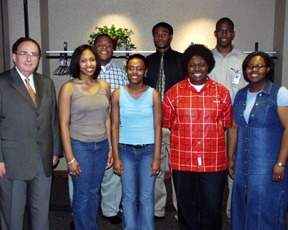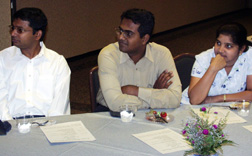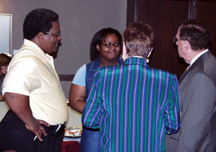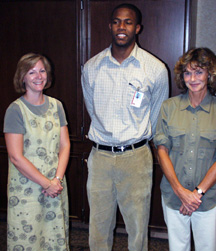 |
From left, Chancellor Harold M. Maurer, M.D., Sadari Fisher, Samuel Wilcinot, Tasia Hurd, Calvin Spellmon, Olamide Alabi, Omar Acres and Iona Rone. |
Samuel Wilcinot (Dillard University) looked around the pharmaceutical science lab and, seeing no other African-Americans, felt like an outcast and wanted to go home. Olamide Alabi (University of Nebraska-Lincoln) hoped the other interns were wrong — that she wouldn’t be stuck washing test tubes and cleaning mice cages. Sadari Fisher was afraid she would be with a group of intimidating older people who would think she was in the way and holding them back.
But according to testimonies given earlier this month at a farewell reception for the interns, their misconceptions were quickly erased. Students expressed heartfelt gratitude to UNMC for providing productive 12-week learning experiences.
Igniting interest in the health professions
After welcoming remarks by John McClain, Ph.D., associate vice chancellor for academic affairs, and Mary McNamee, Ph.D., associate director of student recruitment and director of the Office of Student Equity and Multicultural Affairs, UNMC Chancellor Harold M. Maurer, M.D., spoke to the interns, faculty mentors, family members and friends.
 |
From left, Sanjeeb Sahoo, Jayanth Panyam and Swayam Prabha. |
“I think there is nothing more exciting than talking about research. There is nothing more exciting than finding out something no one else in the world knows about but you. Most discoveries were made by people your age, not my age. They were young, bright, energetic and had great ideas. People have won the Nobel Prize for research findings that were dismissed as insignificant at the time of the discovery. Now that you are engaged in research, you see how exciting it can be. As you mature, you will also experience the benefits of helping people — of saving people. If you save one life, you have saved humanity.
“We hope you will return home with a spark of inspiration that this work is something that you can and want to do.”
Lab partners “like second family now”
Another aspect of bringing minorities to study at UNMC was the need for the students to feel wanted and cared about — on campus and in the Omaha community. Members of local churches and other community groups volunteered their time and assistance to provide social activities for the interns.
 |
Iona Rone and her father, Pastor Stanley Rone, talk with Mary McNamee and Chancellor Harold M. Maurer, M.D. |
Wilcinot fretted the first few days after joining the lab of Vinod Labhasetwar, Ph.D., associate professor in the College of Pharmacy department of pharmaceutical science, but was quickly taken under the wings of three lab mates — graduate students Jayanth Panyam, Swayam Prabha and post-doctoral research associate Sanjeeb Sahoo.
Panyam said that Wilcinot’s lack of experience led the lab members to reevaluate their own instruction techniques. They were accustomed to interns with engineering and science backgrounds who knew lab terminology and other procedures. Panyam, Prabha and Sahoo worked to break down the knowledge Wilcinot needed. When they did, he learned quickly, thoroughly and kept the lab delighted by his inquisitive mind.
“My three lab partners showed me so much love and treated me so well, they are like my second family now,” Wilcinot said. “They really showed me how to handle myself in the lab. The practical knowledge I gained now allows me to understand biology and chemistry at a much more comprehensive level. I am really going to excel when I get back to Dillard.
“In addition, Panyam, Prabha and Sahoo took me home with them and made me a part of their world. In my first couple of weeks, I kept thinking about how much I wanted to go back home. Now that my internship is over, I really wish I could stay longer. I can’t wait to come back next summer.”
 |
Omar Acres with mentors Janee Van Waes, DVM, Ph.D., (at right) assistant professor in genetics, cell biology and anatomy, and Joyce Maddox, research technologist II. |
Fisher restores her dream
Fisher was assigned to study with Lucile Wrenshall, M.D., Ph.D., associate professor in the department of surgery. Instead of intimidation, Fisher’s dreams of a medical career received new impetus.
“I really didn’t think I would learn as much as I did,” Fisher said. “Now, I am more assured that I can do well in the field of science. My mentors helped me see myself as an asset in the research lab. In fact, I always dreamed of becoming a dermatologist, but I had begun to doubt that I could achieve such a goal. Now I have rethought my capabilities and restored my dream to pursue dermatology.”
Alabi discovers “a microcosm of the world”
Alabi wasn’t stuck washing test tubes in the labs of the Center for Neurovirology and Neurodegenerative Diseases. That is not the way CNND Director Howard Gendelman, M.D., and his team does things.
“To say it was a great pleasure to work in Dr. Gendelman’s lab is an understatement,” Alabi said. “Not only did I learn more than I ever expected, but it was such a pleasing experience. Dr. Gendelman’s lab is a microcosm of the world. He has people from Omaha, India, China, Japan, Europe — all over. It wasn’t just what I learned, but the experience of working amongst people from so many different cultures all pursuing medical science.”
Other minority undergraduate interns
During the reception, each intern shared stories of gratitude and learning. Other students who attended the reception included Tasia Hurd, Omar Acres and Calvin Spellmon from Dillard; and Iona Rone from Xavier University. Unable to attend were Denesha Jaggers from Grambling State University; Lindsey Trevino and Fernanda Ruiz from St. Mary’s University in San Antonio, Texas, and Andrea Gomes from the University of Nebraska-Lincoln.